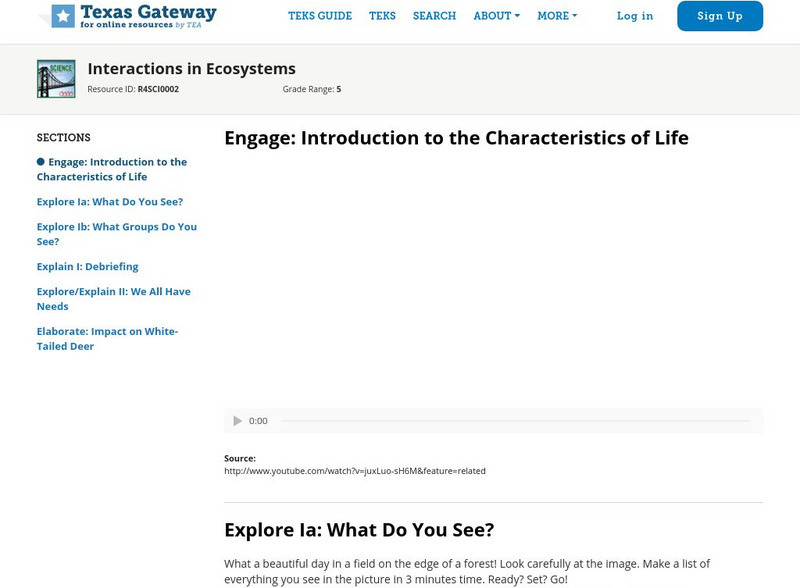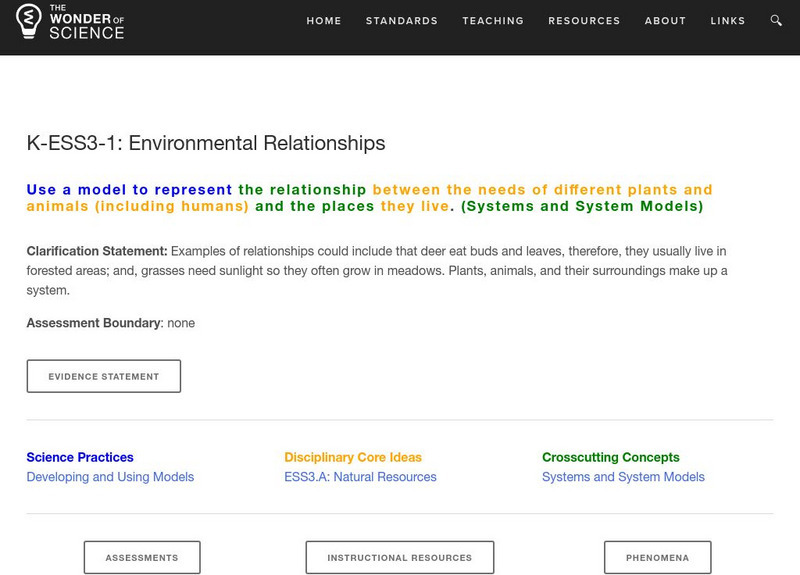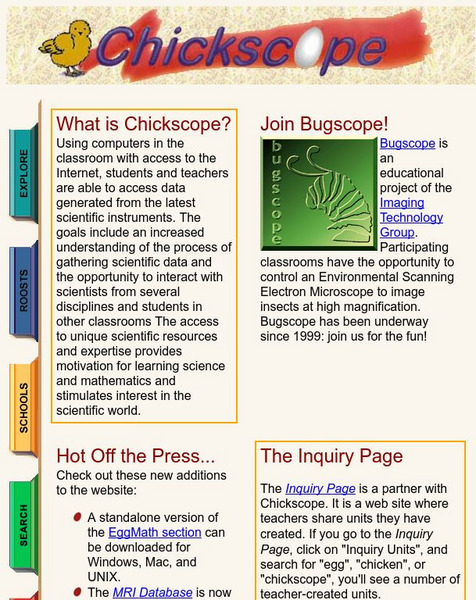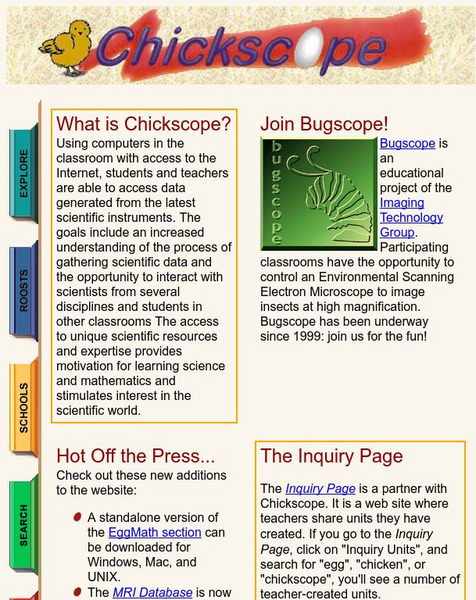Texas Education Agency
Texas Gateway: Introduction to the Characteristics of Life
Earth is the only place we have found life so far. The following tutorial provides a unique look into the characteristics of life.
Globe
The Globe Program: All About Earth: Our World on Stage [Pdf]
This delightful storybook provides young learners an understanding of how the Earth's processes work together. The students of an elementary classroom have been making costumes and practicing lines. Each student is playing the role of a...
The Wonder of Science
The Wonder of Science: K Ess3 3: Environmental Solutions
This NSTA vetted source includes resources to teach ideas on reducing the impact of humans on the environment. Included are assessment ideas, videos, examples, lesson plans, and photos of student work.
The Wonder of Science
The Wonder of Science: K Ess3 1: Environmental Relationships
This NSTA vetted source includes resources to teach about the relationship between the needs of different plants and animals and the places they live. Included are assessment ideas, videos, examples, lesson plans, and photos of student...
Utah Education Network
Uen: Living or Nonliving
Third graders look for living and nonliving elements on the playground.
Utah Education Network
Uen: Trb 3:2 Investigation 2 Greenhouses
Set up a miniature greenhouse to help with understanding how nonliving things affect the growth of living things.
Utah Education Network
Uen: Shrink to Fit
Learn how various living and non-living organisms help and react to one another in a small environment.
Utah Education Network
Uen: Mini Ecosystems
Third graders will make small-scale environments and will describe interactions between living and nonliving things in their environments.
Utah Education Network
Uen: What It Is, What It Isn't
Recognize characteristics of living and nonliving items within an environment.
Utah Education Network
Uen: What's Different About These Worms?
Observe three different worm models and identify characteristics.
Utah Education Network
Uen: Looking at the Community Tree
A neighborhood tree is observed for evidence of interactions between living and nonliving things.
Utah Education Network
Uen: Trb 4:5 Investigation 2 Elevation, Plants & Animals
Fourth graders will understand that elevation is one of the things that affect where and how plants and animals live.
Utah Education Network
Uen: Making a Mini Worm Habitat
Activity shows the process of converting organic waste into usable fertilizer.
Utah Education Network
Uen: Trb 3:2 Investigation 3 Terrariums / Aquariums
Creating aquariums/terrariums help students understand how creatures depend on living and nonliving things.
Utah Education Network
Uen: Trb 3:2 Investigation 1 Intro: Living & Nonliving
Third graders learn to distinguish between living and nonliving things.
Globe
The Globe Program: Earth System Module
Activities help students experiment with what plants need in terms of water, sunlight, and soil, explain how the Earth's processes and components are interconnected, and demonstrate their knowledge of how water, air, soil, and living...
Utah Education Network
Uen: Themepark: Systems: Ecosystem
Find a large collection of internet resources organized around ecosystems. Links to places to go, people to see, things to do, teacher resources, and bibliographies.
Utah Education Network
Uen: Going on a Living and Nonliving Hunt
Distinguish between things that are living, things that were once-living, and things that are nonliving.
Utah Education Network
Uen: Living and Nonliving
Third graders will be able to identify what is living and nonliving in the world around them.
Center for Educational Technologies
Wheeling Jesuit University: How Are Things Divided Among Earth's Four Spheres?
See if you can classify various objects in the categories of land, water, air or living thing. This activity is interactive and you will receive a score for your performance.
City University of New York
Brooklyn College: Exploring Life @ Bi Odot Edu: Signs of Life: Complexity
A nice introduction to the idea that living things are highly organized at several different levels. Great as an introduction to biological complexity.
University of Illinois
University of Illinois Urbana Champaign: Chickscope
Learn how to build your own incubator and download your own "EggMath." Learn about mitosis, genetics, and more. Don't miss the "Yolk of the Day." This site is designed to allow classrooms to collaborate over the Internet with other...
University of Illinois
University of Illinois Urbana Champaign: Chickscope
Learn how to build your own incubator and download your own "EggMath." Learn about mitosis, genetics, and more. Don't miss the "Yolk of the Day." This site is designed to allow classrooms to collaborate over the Internet with other...



![The Globe Program: All About Earth: Our World on Stage [Pdf] eBook The Globe Program: All About Earth: Our World on Stage [Pdf] eBook](https://d15y2dacu3jp90.cloudfront.net/images/attachment_defaults/resource/large/FPO-knovation.png)





